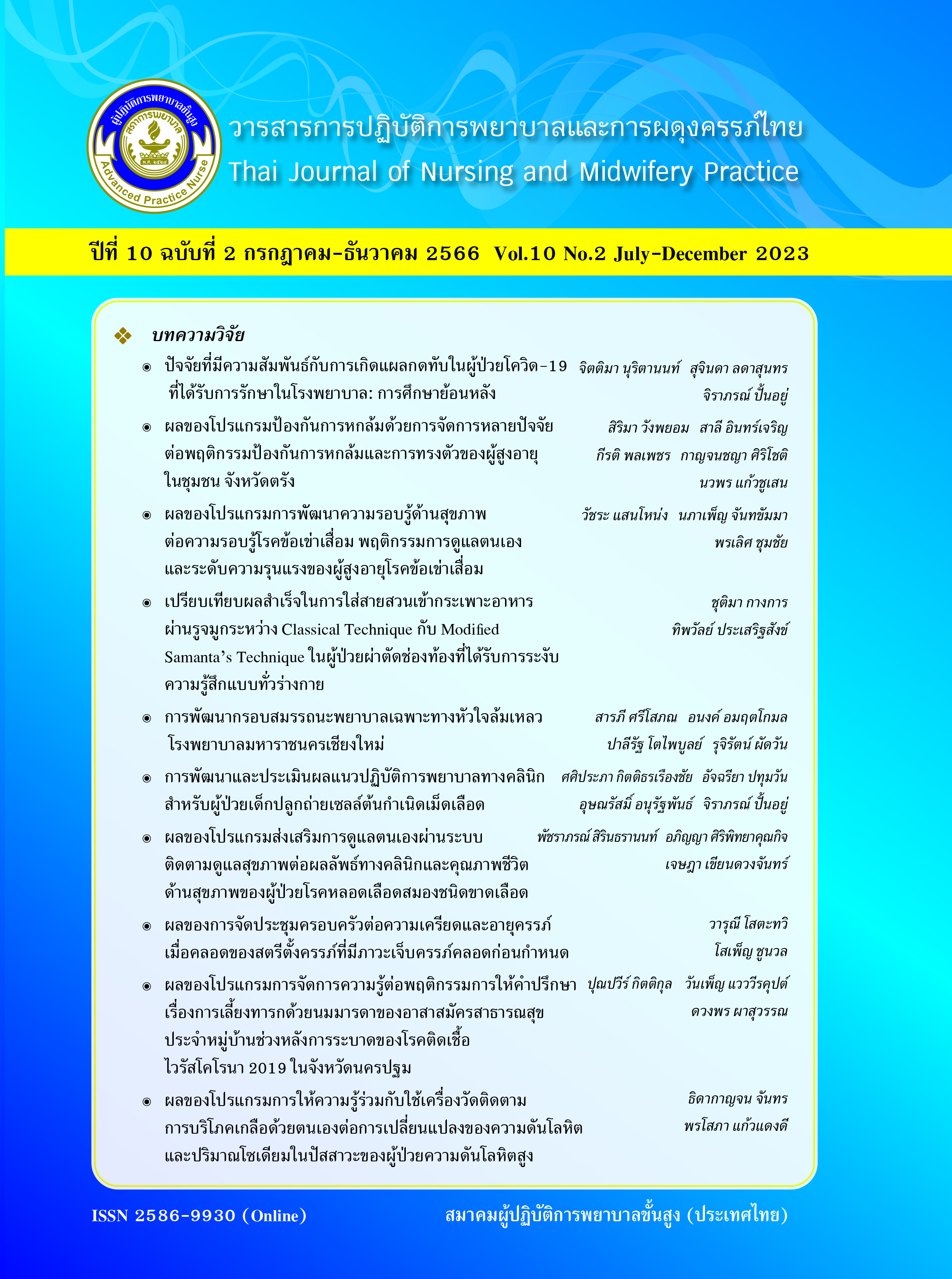Effects of Educational Program Combined with Self-Measuring Dietary Sodium Chloride on Changes in Blood Pressure and Urine Sodium in Patients with Hypertension
Main Article Content
Abstract
Abstract: This quasi-experimental research one-group pre-post test design aimed to compare systolic and diastolic blood pressure and urinary sodium levels in hypertensive patients before and after receiving sodium intake education and self-operating a salt meter. A sample group of 36 people was selected based on certain criteria. The participants were given intensive education on sodium intake and trained to use and monitor their food intake with a salt meter. Follow-up was done every month for three months. Data were analyzed using descriptive statistics and paired t-test. Results showed that the hypertensive patients who participated in the research had a significant decrease of the systolic and diastolic blood pressures and urinary sodium levels (p < 0.05). Therefore, the education on sodium intake and the use of a salt meter can reduce blood pressure and urinary sodium levels in hypertensive patients. However, further study is needed with randomized controlled trials before the program can be widely used.
Downloads
Article Details

This work is licensed under a Creative Commons Attribution-NonCommercial-NoDerivatives 4.0 International License.
References
WHO-NMH-NVI-17.9-eng.pdf [Internet]. [cited 2022 Jan 11]. Available from: https://apps.who.int/iris/bitstream/handle/10665/259232/WHO-NMH-NVI-17.9-eng.pdf
Dahl LK. Possible role of salt intake in the development of essential hypertension. In: Bock KD, Cottier PT, editors. Essential Hypertension: An International Symposium Berne, June 7th-10th, 1960 Sponsored by CIBA [Internet]. Berlin, Heidelberg: Springer; 1960 [cited 2022 Mar 28]. p. 53-65. Available from: https://doi.org/10.1007/978-3-642-49899-2_4
Vogt L, Waanders F, Boomsma F, de Zeeuw D, Navis G. Effects of dietary sodium and hydrochlorothiazide on the antiproteinuric efficacy of losartan. J Am Soc Nephrol JASN 2008;19(5):999-1007.
Mozaffarian D, Fahimi S, Singh GM, Micha R, Khatibzadeh S, Engell RE, et al. Global Sodium Consumption and Death from Cardiovascular Causes. N Engl J Med 2014;371(7):624-34.
Mente A, O’Donnell MJ, Rangarajan S, McQueen MJ, Poirier P, Wielgosz A, et al. Association of Urinary Sodium and Potassium Excretion with Blood Pressure. N Engl J Med 2014;371(7):601-11.
Boonsiri C, Wongsawang N. The effect of program promoting food consumption for sodium reduction on knowledge, sodium consumption behaviors and urinary sodium in people at Khubua sub-district in Ratchaburi province. Thai J Nurs 2022;71(3):10-7. (In Thai)
Irwan AM, Kato M, Kitaoka K, Ueno E, Tsujiguchi H, Shogenji M. Development of the salt-reduction and efficacy-maintenance program in Indonesia. Nurs Health Sci 2016;18(4):519-32.
The Knowledge-Attitude-Practice Model. 2013 [Internet]. [cited 2022 May 23]. Available from: https://www.researchgate.net/figure/The-Knowledge-Attitude-Practice-Model-Bano-etal-2013-Advantage-of-KAP-model-The-KAP_fig6_322675323
Chonsin P, Kaveevivitchai C, Neelapaichit N, Piaseu N. Impact of a Blood Pressure Regulation Programme on Health Beliefs, Health Behaviour, Amount of Sodium Intake and Hypertension Level in Community Members with Hypertension. JTNMC 2559;31(4):63-75. (In Thai)
Division of Non Communicable Diseases [Internet].[cited 2022 May 11]. Available from: https://ddc.moph.go.th/uploads/publish/1308920220905030102.pdf. (In Thai)
HDC - Report [Internet]. [cited 2022 June 5]. Available from: https://lri.hdc.moph.go.th/hdc/reports/report.php?cat_id=b2b59e64c4e6c92d4b1ec16a599d882b&id=29eec762c9591d1f8092da14c7462361. (In Thai)
Wiriyatanakorn S, Mukdadilok A, Kantachuvesiri S, Mekhora C, Yingchoncharoen T. Impact of selfmonitoring of salt intake by salt meter in hypertensive patients: A randomized controlled trial (SMALSALT). J Clin Hypertens Greenwich Conn 2021;23(10):1852-61.
Thatsaeng B, Lasuka D, Khampolsin T. Effects of a Self-management Supporting Program on Self–management Behaviors and Blood Pressure among Elders with Hypertension. Thai J Nurs 2012;4(39):124-137. (In Thai)


